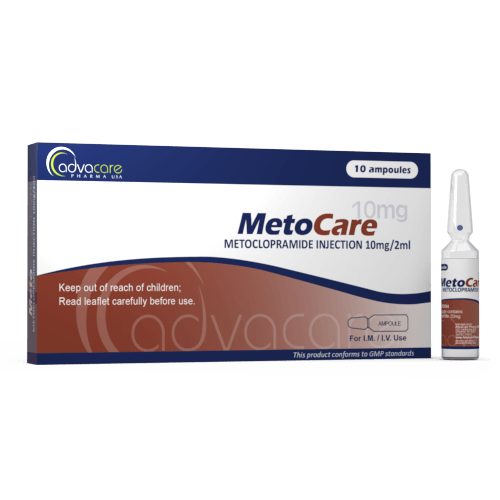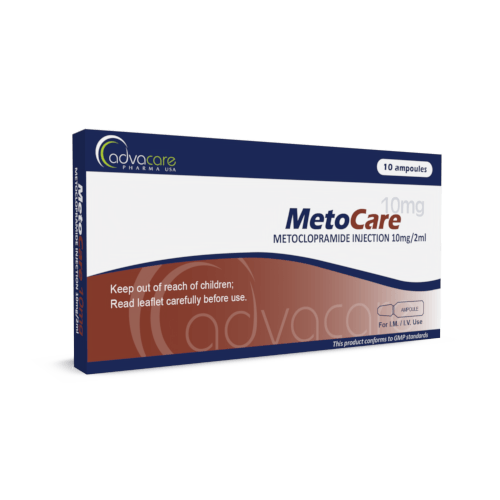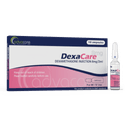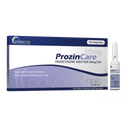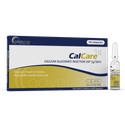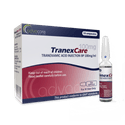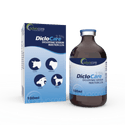- Home›
- Pharmaceuticals›
- Injections›
- Small Volume Injections›
- Metoclopramide Injection
Metoclopramide Injection
Dosage
Packaging
What is Metoclopramide?
Active Ingredients: Metoclopramide
Metoclopramide Injection is used in the treatment of severe diabetic gastroparesis. This medication is also prescribed to treat and prevent nausea after surgery and chemotherapy. Metoclopramide may also be used to facilitate diagnostic examinations of the stomach and intestines involving contrasts.
Metoclopramide is a dopamine D2 antagonist with prokinetic and antiemetic effects. Its antagonism of synaptic D2 receptors, agonism of serotonin 5-HT4 receptors, and antagonism of the inhibition of muscarinic receptors enhances the release of acetylcholine. Acetylcholine increases lower esophageal sphincter and gastric tone, and dopamine relaxes the gastrointestinal (GI) tract, which accelerates gastric emptying and increases GI motility. The increase in gut motility helps relieve GI discomfort caused by gastroparesis. Metoclopramide’s antiemetic effects are a result of its inhibition of dopamine D2 and serotonin 5-HT3 receptors in the area postrema of the brain, which decreases the symptoms of nausea and vomiting.
AdvaCare Pharma is a trusted exporter of Metoclopramide Injections, Oral Solutions, and Tablets. Our supply chain is thoroughly vetted to ensure it meets health, safety, and environmental standards. This medication is produced in our GMP-certified manufacturing facilities in China, India, and the USA.
Why are we a leading Metoclopramide manufacturer?
AdvaCare Pharma, a US-owned pharmaceutical company, is a manufacturer of Metoclopramide Injection with GMP-compliant manufacturing facilities located worldwide. We conduct frequent GMP, third-party and internal facility inspections to ensure that our manufactured injectable treatments exceed the stringent requirements of importing countries and our distributors.
As a renown Metoclopramide manufacturer and global supplier of 120+ pharmaceutical injection products, our global reach extends to over 65 markets ensuring that pharmaceutical distributors, hospitals, pharmacies, NGOs and government institutions receive the quality-assured treatments they need.
Uses
What is Metoclopramide used for?
It is used to relieve symptoms associated with diabetic gastroparesis and to treat and prevent vertigo, nausea, and vomiting associated with postoperative states, cancer chemotherapy, and radiation sickness.
Metoclopramide Injection may also be used to facilitate small intestine intubation and aid radiological examination of the gastrointestinal (GI) tract by stimulating the transit of imaging contrasts through the GI.
How are Metoclopramide Injections used?
This medication is manufactured as a solution that can be injected intramuscularly (IM) or intravenously (IV). It is to be administered by a healthcare professional in a hospital or clinic setting.
What dose should be given and for how long?
Adults Dosage may vary based on different medical indications:
- For the treatment of severe gastroparesis, the recommended dose is 10mg. IV infusions should be administered slowly over a 1 to 2-minute period. Injections may be given for up to 10 days.
- For the prevention of nausea and vomiting associated with chemotherapy, the recommended dose for highly emetogenic medications is 2mg/kg and 1mg/kg for less emetogenic regimens. IV infusions should be administered slowly over a period of no less than 15 minutes and given 30 minutes before chemotherapy. Subsequent injections should be repeated every 2 hours for 2 doses, and then every 3 hours for 3 doses.
- For the prevention of nausea and vomiting associated with operations, the recommended dose is a 10mg IM injection given near or at the end of the procedure. Doses of 20mg may be used, if needed.
- To facilitate small intestine intubation if the tube cannot pass the pylorus within 10 minutes, a single IV infusion of 10mg may be given over a 1 to 2-minute period.
- To facilitate gastric emptying for radiological examinations, a single IV infusion of 10mg may be given over a 1 to 2-minute period.
Children (> 14 years) To facilitate small bowel intubation if the tube cannot pass the pylorus within 10 minutes, a single IV infusion of 10mg may be given over a 1 to 2-minute period. To facilitate gastric emptying for radiological examinations, a single IV infusion of 10mg may be given over a 1 to 2-minute period.
Children (6-14 years) To facilitate small intestine intubation if the tube cannot pass the pylorus within 10 minutes, a single IV infusion of 2.5 to 5mg may be given over a 1 to 2-minute period. To facilitate gastric emptying for radiological examinations, a single IV infusion of 2.5 to 5mg may be given over a 1 to 2-minute period.
Children (< 6 years) To facilitate small intestine intubation if the tube cannot pass the pylorus within 10 minutes, a single IV infusion of 0.1mg/kg may be given over a 1 to 2-minute period. To facilitate gastric emptying for radiological examinations, a single IV infusion of 0.1mg/kg may be given over a 1 to 2-minute period.
Injection doses exceeding 10mg should be diluted. IV infusions of undiluted metoclopramide should be made slowly over a 1 to 2-minute period. IV infusions of diluted metoclopramide should be made slowly over a period of no less than 15 minutes.
Metoclopramide should not be given for a period longer than 12 weeks due to the risk of developing tardive dyskinesia.
Refer to a doctor or pharmacist for guidelines on the exact dosage. The dosage is based on medical condition, response to the treatment, age, and weight.
Who can use Metoclopramide?
Metoclopramide can be administered to adults and some children, but caution is advised for specific groups of patients.
Pregnant Human and animal data on metoclopramide use during pregnancy have not reported an increased risk of adverse pregnancy-related outcomes. Metoclopramide can cross the placental barrier and may result in extrapyramidal signs and methemoglobinemia in neonates that are exposed to metoclopramide during delivery. Metoclopramide Injection use during pregnancy is likely not medically necessary.
Nursing Metoclopramide is excreted in human milk. Nursing infants should be monitored for extrapyramidal side effects and methemoglobinemia. The short-term administration of Metoclopramide Injection to nursing patients is unlikely to cause adverse events in nursing infants.
Pediatric The safety and efficacy of metoclopramide have not been established in children except for the facilitation of small intestine intubation. Metoclopramide is not recommended for pediatric patients due to the risk of adverse events, such as tardive dyskinesia (TD), extrapyramidal symptoms, and methemoglobinemia (particularly in neonates).
Geriatric Studies of metoclopramide use are insufficient to determine whether older adults (≥ 65 years) respond differently than younger adults (< 65 years). Due to age-related decreases in renal function and an increased risk of parkinsonian and TD side effects in older patients, decreased dosing is recommended.
Other warnings
In patients with moderate to severe renal insufficiency, doses of Metoclopramide Injection should be reduced by half to lower the risk of adverse events.
In patients with moderate to severe hepatic insufficiency, metoclopramide dosages should be reduced to lower the risk of adverse events. Dosage reductions in those with mild hepatic insufficiency is not necessary.
Metoclopramide should not be used in cases where increasing GI motility may be dangerous, such as instances of GI bleeding, mechanical obstruction, or perforation.
Metoclopramide is not recommended for use in patients with a history of depression, as it may increase the risk of suicidal ideation and behaviors and precipitate or worsen depression.
Prolonged (> 12 weeks) metoclopramide use can increase the risk of TD, which can result in involuntary movements of the face, tongue, trunk, and/or extremities, that is potentially irreversible. This risk is elevated in patients with diabetes mellitus and older patients, particularly older females.
Extrapyramidal symptoms (EPS), parkinsonian symptoms, and motor restlessness have been reported with metoclopramide use. They are more likely to occur in adults younger than 30 and at doses exceeding the recommendations. Other medications that can cause EPS, like antipsychotics, should be avoided.
Rare cases of neuroleptic malignant syndrome (NMS) have been reported. NMS is potentially fatal and can manifest as a very high fever (hyperpyrexia), muscle rigidity, altered mental status, irregular heartbeat or blood pressure, rapid heartbeat, and excessive sweating.
Metoclopramide may cause drowsiness and reduce the mental and/or physical abilities required to perform tasks that require mental alertness, such as operating a vehicle or other machinery.
Metoclopramide may decrease the absorption of medications from the stomach and increase the absorption of drugs from the small intestine.
Food delivery to the intestines will be accelerated, which may affect blood sugar control in diabetic patients that use exogenous insulin. Insulin dosage and timing may need to be adjusted to prevent hypoglycemia in such patients.
Side Effects
As with all pharmaceuticals, some unwanted effects can occur from the use of Metoclopramide Injection.
Common side effects include, but may not be limited to:
- swelling near the injection site
- drowsiness
- headache
- itching
- sleeping problems
- breast swelling
- nausea
- vomiting
- thirst
Serious side effects may include:
- signs of an allergic reaction
- tardive dyskinesia (due to long-term usage)
- changes in mood or behavior (suicidal thoughts, worsening or new depression)
- seizures
- rapid weight gain or unusual swelling
- high fever, excessive sweating, irregular heartbeat
- high blood pressure (hypertension)
For a comprehensive understanding of all potential side effects, consult a medical professional.
If any symptoms persist or worsen, or you notice any other symptoms, please call your doctor.
Precautions
Do NOT use Metoclopramide Injection if:
- You are allergic to metoclopramide or any other ingredient.
- You have gastrointestinal bleeding or other GI problems.
- You have pheochromocytoma.
- You have a history of seizures.
- You are using medications that increase extrapyramidal reactions.
- You have a history of tardive dyskinesia or are taking medications that may cause it.
- You have Parkinson’s disease or are taking antiparkinsonian agents.
Before treatment, consult your doctor regarding any medications you are taking to address potential drug interactions.
This medication may not be suitable for people with certain conditions, so it is important to consult with a doctor if you have any health conditions.
References
Effect of Metoclopramide in Diabetic Gastroparesis
The aim of this study was to determine the effect of metoclopramide parenterally and orally on delayed gastric emptying of a radionuclide test meal in symptomatic patients with diabetic gastroparesis not explained by ulceration or other mechanical problems. This trial was also focused on evaluating in a double-blind crossover fashion the efficacy of metoclopramide in relieving the symptoms of diabetic gastroparesis.
The study included 13 patients with subjective indications of gastric stasis, confirmed by delayed gastric emptying of an isotope-labeled semisolid meal, which was significantly hastened (p < 0.05) following the administration of 10mg of metoclopramide intravenously. Patients underwent a randomized double-blind crossover trial, receiving either metoclopramide 10mg or a placebo before meals and bedtime for 3 weeks. Throughout the metoclopramide therapy period, symptoms such as nausea, vomiting, anorexia, fullness, and bloating were alleviated (p < 0.05) compared to placebo, with an overall mean symptom reduction of 52.6%. Following the completion of the trial, gastric emptying studies in seven patients led to reduced gastric retention.
The conclusion is that metoclopramide is an important therapeutic adjunct in the management of diabetic gastroparesis and has antiemetic properties.

You might be interested in...
Why AdvaCare Pharma?
As an industry leader, we are aware of our responsibility to provide affordable and sustainable solutions to improve healthcare worldwide.
